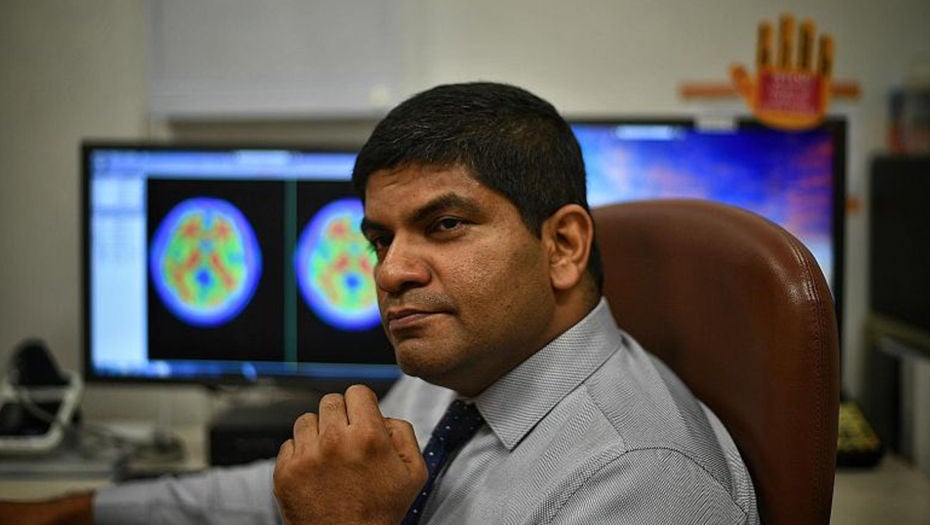
Associate Professor Nagaendran Kandiah in front of brain images showing harmful amyloid plaques that appear in red.ST PHOTO: ARIFFIN JAMAR
New tests allow doctors to take a peek into the brain to see if a person has pre-dementia
Chang Ai-Lien, The Straits Times
As the nation greys, more people are being struck with dementia.
An estimated 80,000 patients are expected to have the debilitating condition by 2030, almost double the current figure.
But experts believe that this number is just the tip of the iceberg.
Doctors at the National Neuroscience Institute (NNI) estimate that 150,000 people here have "pre-dementia", based on extrapolations from figures available in other countries.
While they will show few symptoms, if any, an insidious change is already taking place. Abnormal proteins linked to Alzheimer's disease - which causes seven in 10 cases of dementia - have already started attacking the brain.
These amyloid plaques collect in the brain and kill its nerve cells.
"In the past, the only way of confirming dementia was to slice into the brain on the autopsy table," said Associate Professor Nagaendran Kandiah, senior consultant at NNI's Department of Neurology.
"Even dementia specialists doing interviews and memory tests get it right only 70 per cent of the time."
Now, though, new tests can take a peek into the brain while the patient is still alive.
An amyloid PET (positron emission tomography) scan, which became available here this year, is used to make a picture of amyloid plaque accumulation within a person's brain.
This allows doctors to see how much of the harmful plaque is present, and which part of the brain it is affecting. Brain changes can take place 15 years before the mild symptoms of dementia, such as forgetfulness, appear.
A more invasive alternative is to test for amyloid in the spinal fluid. This involves inserting a small needle into the spine. The test has been available for several years.
"If you're amyloid positive, your risk of dementia is high. If it's negative, the risk is almost zero," said Prof Kandiah.
The silver lining is that if the illness is caught at the pre-dementia stage, patients have a chance to defuse this bomb.
"People don't start out with dementia overnight, this is a progressive disease, and the earlier we start, the better the outcome," he said.
Indeed, a landmark Finnish study found that it is possible to prevent cognitive decline in at-risk older folk using various lifestyle interventions such as diet, exercise and cognitive training.
In Singapore, at-risk seniors participating in the ongoing Healthy Ageing Promotion Programme For You (Happy) effort here, for instance, have been able to reverse frailty and improve their memory, on top of feeling happier and less isolated.
STEMMING DECLINE
People don't start out with dementia overnight, this is a progressive disease, and the earlier we start, the better the outcome.
ASSOCIATE PROFESSOR NAGAENDRAN KANDIAH, senior consultant at National Neuroscience Institute's Department of Neurology.
At NNI, three clinical trials for pre-dementia patients are under way to test potential anti-amyloid drugs to treat the disease.
One of the patients in the trial, retired clerk Margaret Tan, 71, believes that her hourly qigong exercise sessions every morning have helped her keep dementia at bay.
"I'm still independent and can do things on my own, like going out with friends or going to church," said Ms Tan, who is single and lives in a four-room flat in Joo Seng.
Said Associate Professor Reshma Merchant, senior consultant and head of the Division of Geriatric Medicine at the National University Hospital: "While there is no cure for dementia, dementia may be preventable, and the onset can be delayed."
She suggested that since prevalence of pre-frailty and pre-dementia is higher in those with chronic diseases such as hypertension and diabetes, simple screening questions and assessments could be ramped up for those above 50 years of age, especially in the primary care setting.
"There has to be greater publicity and awareness on prevention, and self-empowerment to be in control," she added.

SOURCE: THE STRAITS TIMES SINGAPORE PRESS HOLDINGS LIMITED. REPRODUCED WITH PERMISSION.
Contributed by














 Get it on Google Play
Get it on Google Play